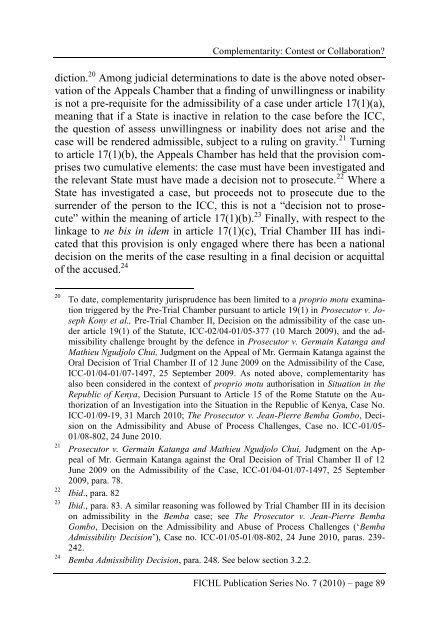Complementarity: Contest or Collaboration? - FICHL
Complementarity: Contest or Collaboration? - FICHL
Complementarity: Contest or Collaboration? - FICHL
Create successful ePaper yourself
Turn your PDF publications into a flip-book with our unique Google optimized e-Paper software.
<strong>Complementarity</strong>: <strong>Contest</strong> <strong>or</strong> Collab<strong>or</strong>ation?<br />
diction. 20 Among judicial determinations to date is the above noted observation<br />
of the Appeals Chamber that a finding of unwillingness <strong>or</strong> inability<br />
is not a pre-requisite f<strong>or</strong> the admissibility of a case under article 17(1)(a),<br />
meaning that if a State is inactive in relation to the case bef<strong>or</strong>e the ICC,<br />
the question of assess unwillingness <strong>or</strong> inability does not arise and the<br />
case will be rendered admissible, subject to a ruling on gravity. 21 Turning<br />
to article 17(1)(b), the Appeals Chamber has held that the provision comprises<br />
two cumulative elements: the case must have been investigated and<br />
the relevant State must have made a decision not to prosecute. 22 Where a<br />
State has investigated a case, but proceeds not to prosecute due to the<br />
surrender of the person to the ICC, this is not a “decision not to prosecute”<br />
within the meaning of article 17(1)(b). 23 Finally, with respect to the<br />
linkage to ne bis in idem in article 17(1)(c), Trial Chamber III has indicated<br />
that this provision is only engaged where there has been a national<br />
decision on the merits of the case resulting in a final decision <strong>or</strong> acquittal<br />
of the accused. 24<br />
20 To date, complementarity jurisprudence has been limited to a proprio motu examination<br />
triggered by the Pre-Trial Chamber pursuant to article 19(1) in Prosecut<strong>or</strong> v. Joseph<br />
Kony et al., Pre-Trial Chamber II, Decision on the admissibility of the case under<br />
article 19(1) of the Statute, ICC-02/04-01/05-377 (10 March 2009), and the admissibility<br />
challenge brought by the defence in Prosecut<strong>or</strong> v. Germain Katanga and<br />
Mathieu Ngudjolo Chui, Judgment on the Appeal of Mr. Germain Katanga against the<br />
Oral Decision of Trial Chamber II of 12 June 2009 on the Admissibility of the Case,<br />
ICC-01/04-01/07-1497, 25 September 2009. As noted above, complementarity has<br />
also been considered in the context of proprio motu auth<strong>or</strong>isation in Situation in the<br />
Republic of Kenya, Decision Pursuant to Article 15 of the Rome Statute on the Auth<strong>or</strong>ization<br />
of an Investigation into the Situation in the Republic of Kenya, Case No.<br />
ICC-01/09-19, 31 March 2010; The Prosecut<strong>or</strong> v. Jean-Pierre Bemba Gombo, Decision<br />
on the Admissibility and Abuse of Process Challenges, Case no. ICC-01/05-<br />
01/08-802, 24 June 2010.<br />
21 Prosecut<strong>or</strong> v. Germain Katanga and Mathieu Ngudjolo Chui, Judgment on the Appeal<br />
of Mr. Germain Katanga against the Oral Decision of Trial Chamber II of 12<br />
June 2009 on the Admissibility of the Case, ICC-01/04-01/07-1497, 25 September<br />
2009, para. 78.<br />
22 Ibid., para. 82<br />
23 Ibid., para. 83. A similar reasoning was followed by Trial Chamber III in its decision<br />
on admissibility in the Bemba case; see The Prosecut<strong>or</strong> v. Jean-Pierre Bemba<br />
Gombo, Decision on the Admissibility and Abuse of Process Challenges („Bemba<br />
Admissibility Decision‟), Case no. ICC-01/05-01/08-802, 24 June 2010, paras. 239-<br />
242.<br />
24 Bemba Admissibility Decision, para. 248. See below section 3.2.2.<br />
<strong>FICHL</strong> Publication Series No. 7 (2010) – page 89





